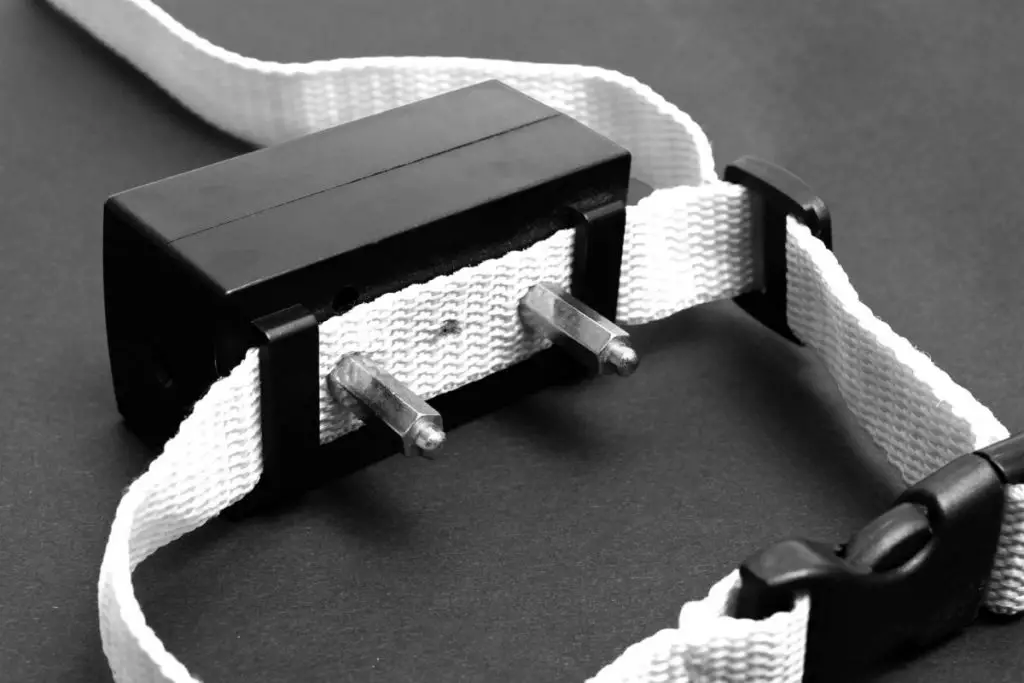Table of Contents

Shock collars are a form of training collar that are used to control behavior or punish a dog, allowing the owner to administer a shock to the animal.
However, if you’re curious about shock collars, you might be wondering: Does a shock collar hurt a dog?
In this article, I will cover some important information about shock collars, including whether a shock collar hurts a dog, and the dangers of using shock collars.
Keep reading to find out more.
What Is A Shock Collar?

As the name suggests, a shock collar is a training collar that delivers a shock of varying intensity and duration to a dog via a remote control.
It is often claimed that using shock collars is an effective method for preventing dogs from chasing livestock on farms.
People might hear about shock collars and view them as a quick fix to the troubles they are experiencing training their dogs.
However, an overwhelming amount of research demonstrates that using an electric collar doesn’t create a greater deterrence for disobedience in your dog, nor does it help your dog in better learning outcomes.
This is why shock collars are seen as a cruel method of training your dog, especially when they are so many other ways to train your dog without physical and psychological torture.
Does A Shock Collar Hurt A Dog?
Yes, shock collars cause unnecessary pain and suffering for dogs. There’s a reason why shock collars are as controversial as they are.
In fact, they have been banned in multiple countries, including the UK, Norway, Denmark, Sweden, Germany, Austria, Switzerland, Slovenia, Quebec, as well as some parts of Australia.
And if that’s not enough reason to put you off them, maybe the following information is.
One of the main concerns when it comes to the use of shock collars is that there is a much greater chance of abuse, particularly when the trainer administers a shock for the sole purpose of punishment as opposed to training the dog.
In addition to this, dog owners often misuse dog collars. While some people use them to suppress unwanted behavior, they do not teach a dog what you would like them to do instead.
Over time, your dog can begin to associate this painful shock with and can create fear, anxiety and insecurity, as well as aggression in your dog. This can result in them directing this at you, other people, or other animals.
Rewards-based training methods are proven to be much more effective, and they don’t compromise the health or welfare of your dog.
Are Shock Collars Safe?
No, nothing that can have a detrimental effect on a dog’s physical and mental wellbeing should be considered safe to use. In fact, many vets are vehemently against the use of shock collars.
To put it bluntly, the multiple countries that have banned shock collars as an inhumane way to train dogs is a testament to the fact that they are not safe and should never be used.
Shock collars are not a quick fix that will speed up the process of training your dog. Although it might suppress some behaviors, the damage in the long run will outweigh the benefits of using a shock collar.
The Dangers Of Using A Shock Collar
There are many dangers of using shock collars. These dangers are:

Shock Collars Cause Pain To Your Dog
There’s no two ways about it, if you’re administering a shock to a dog, you are harming them both physically and psychologically.
Instead of teaching your dog with rewards and positive reinforcement, shock collars also harm your dog’s progress in that they begin to fear their owner and are much more likely to become aggressive as a result of this.
When there are positive training methods that are proven to be more effective, and also don’t involve harming your dog, why would you resort to using a shock collar?
Shock Collars Damage The Trust You Have Built With Your Dog
The bond between you and your dog should be cherished and kept at the forefront of your mind when you’re using any training method.
Using a shock collar is a one way track to losing your dog’s trust, as you’re causing them unwarranted pain and distress.
Using aversive training methods based on fear and pain may result in your dog avoiding you, or worse, becoming aggressive towards you and other people that they come into contact with.
Instead of building on the love and trust that you have with your dog, using a shock collar to train them will cause them to associate you with this pain, negatively impacting your relationship with them.
Shock Collars Damage The Communication Between You And Your Dog
Every dog has a way of communicating and expressing how they feel, whether this is through barking, growling, whimpering, or whining.
Using a shock collar is an almost definite way to cause a breakdown in the communication between you and your dog, as if they are getting shocked every time they bark, they will slowly begin to associate their way to communicate with being punished.
Shock Collars Can Instill Fear And Anxiety In Your Dog
The mental impact that a shock collar can have on your dog is severe. If you are using a shock collar to correct and control your dog’s behavior, this can begin to change its instinct and natural behaviors.
For instance, if you shock your dog every time they bark at your neighbor or the mailman, then this will cause them to begin associating these people with pain.
As a result, this could instill even more fear and anxiety around strangers.
In Summary
Yes, a shock collar hurts your dog, and no one should use one knowing that they are an inhumane and unnecessarily cruel way to train your dog.
Shock collars are not a quick fix to all of your training problems.
There are plenty of other positive training methods available that don’t involve harming your dog and have been proven to be much more effective than administering a shock to your pet.
If you’re having trouble training your dog, seek the advice and help from a professional on how to train your dog with positive reinforcement.
If you are to keep the strong bond and train your dog effectively, using a shock collar is not something you should ever resort to or inflict on your dog.
